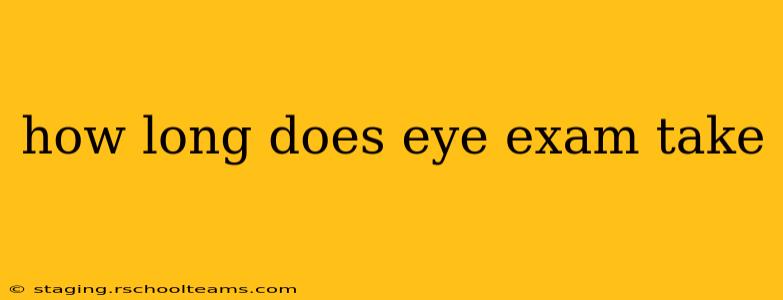How Long Does an Eye Exam Take? A Comprehensive Guide
The duration of an eye exam can vary significantly depending on several factors. While a basic eye exam might be relatively quick, a more comprehensive assessment can take considerably longer. Understanding what to expect can help alleviate any pre-exam anxiety.
Factors Affecting Exam Duration:
Several factors influence how long your eye exam will take:
- Type of Exam: A routine vision screening to check your prescription will be much shorter than a comprehensive eye exam that includes assessments for glaucoma, cataracts, macular degeneration, and other eye health conditions.
- Your Individual Needs: If the optometrist or ophthalmologist detects any potential issues during the exam, they may need to conduct additional tests or spend more time investigating.
- Doctor's Schedule and Patient Volume: The doctor's schedule and the number of patients they're seeing that day can also impact the overall time. It's always a good idea to allow ample time for your appointment.
- Diagnostic Testing: Advanced diagnostic tests such as OCT (Optical Coherence Tomography) or visual field testing add considerable time to the exam.
What to Expect During a Typical Eye Exam:
A standard eye exam generally includes the following stages:
- Initial Consultation and Medical History: This involves discussing your medical history, any current eye problems, family history of eye diseases, and medications you are taking. This stage can take 15-20 minutes.
- Visual Acuity Test: This assesses your ability to see at various distances using an eye chart. This usually takes a few minutes.
- Refraction Test: This determines your prescription for glasses or contact lenses. This part may involve using different lenses to find the optimal correction. This takes about 10-15 minutes.
- Eye Muscle and Coordination Tests: These tests evaluate how well your eyes work together. This is typically a quick process, lasting only a few minutes.
- Eye Health Examination: This involves using instruments to examine the structures of your eyes, including the retina, optic nerve, and other internal parts. This step can take anywhere from 10 to 20 minutes, depending on the complexity.
How Long Does a Routine Eye Exam Take?
A routine eye exam for a relatively healthy individual with no significant concerns usually takes between 30 and 45 minutes. This includes the basic tests outlined above.
How Long Does a Comprehensive Eye Exam Take?
A comprehensive dilated eye exam, which is more thorough and includes additional tests for early detection of eye diseases, can take between 45 minutes and an hour or even longer. The dilation process itself takes some time, and the eye doctor will need time to thoroughly examine the dilated pupils.
H2: What is included in a comprehensive eye exam?
A comprehensive eye exam goes beyond simply checking your vision. It includes a thorough evaluation of the overall health of your eyes and the structures within. This usually involves dilation of your pupils to allow for better visualization of the retina and optic nerve. Diagnostic tests like OCT or visual field testing are often part of a comprehensive exam.
H2: How often should I have a comprehensive eye exam?
The frequency of comprehensive eye exams depends on your age, overall health, and risk factors for eye disease. Generally, adults should have a comprehensive exam at least every two years. Those with a family history of eye diseases, diabetes, or hypertension might need more frequent checkups.
H2: What if I need extra tests during my eye exam?
If the optometrist or ophthalmologist identifies any potential issues during your exam, they may recommend additional tests. This will naturally prolong the exam duration. These tests can help in early diagnosis and treatment of various eye conditions.
H2: How can I prepare for my eye exam?
To ensure a smooth and efficient eye exam, be sure to arrive on time and bring your current eyeglasses or contact lenses. Be prepared to discuss your medical history, family history of eye diseases, and any medications you are currently taking.
Conclusion:
The duration of your eye exam is highly variable, depending on individual needs and the scope of the examination. While a simple vision check might only take 30 minutes, a thorough comprehensive eye exam can easily extend to an hour or more. It’s best to be prepared for a range of potential durations and allow sufficient time for your appointment. Remember, proactive eye care is crucial for maintaining good vision and overall eye health.
